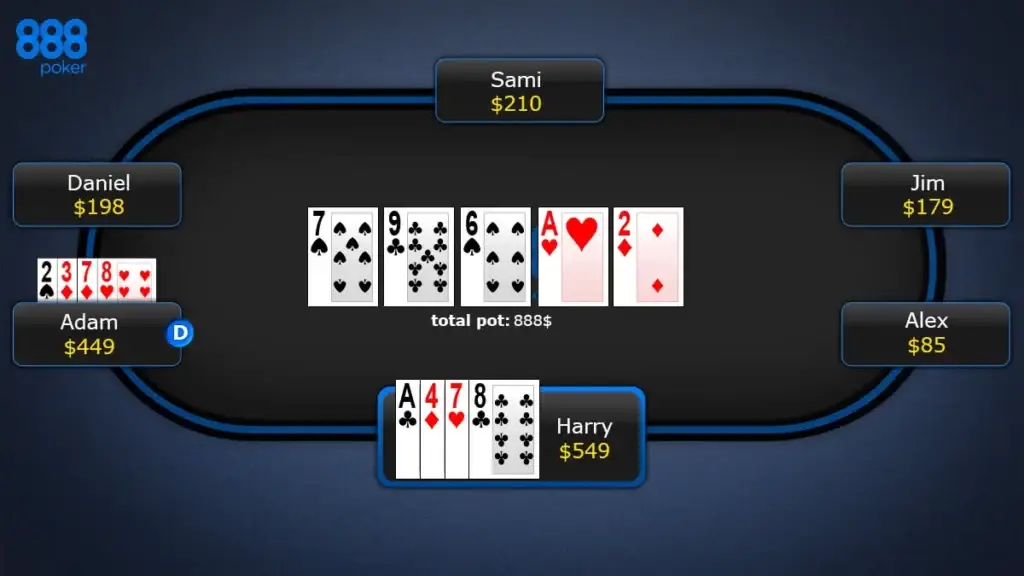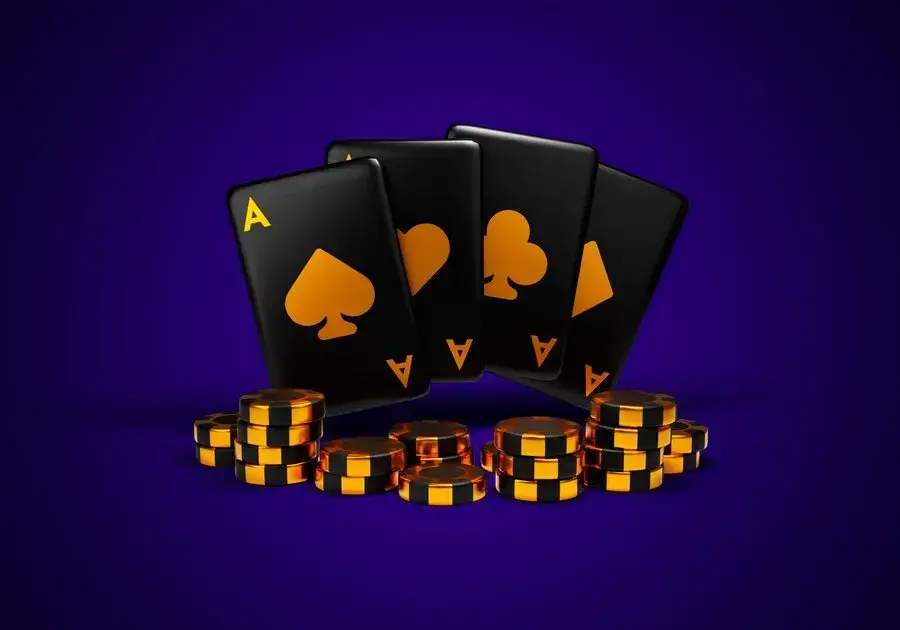There are many types of poker, each with unique characteristics that appeal to players around the world. Some appreciate the spice of Texas Hold’em, while others enjoy the variety of Omaha. Let’s take a look at the popular varieties so you can find your match.
Texas Hold’em
The most popular type of poker, which requires from the player not only luck, but also the ability to analyse the situation, calculate probabilities and ‘read’ opponents. It is important to use maths and psychology in the game. Each move can turn into a victory or a defeat, so the participant needs extreme concentration and the ability to anticipate the actions of opponents.
The dynamics of Hold’em is that each new card on the ‘flop’, ‘turn’ or ‘river’ can fundamentally change the layout on the table. To succeed, you need to be able to adapt to rapidly changing circumstances and act decisively. In this type of poker it is especially important to develop the skill of observation – every move of your opponent, every bet or lack thereof can give valuable clues. This makes Hold’em a fun game that combines intuition and logic, and only confident and courageous players succeed.
Omaha
 A type of poker where players are dealt four cards instead of two. They offer many opportunities to create strong combinations, but they also make you take more risks. To win, you have to be prepared to constantly change, because every decision is a step into the unknown. Omaha is especially interesting for those who prefer complex strategies and are willing to take risks.
A type of poker where players are dealt four cards instead of two. They offer many opportunities to create strong combinations, but they also make you take more risks. To win, you have to be prepared to constantly change, because every decision is a step into the unknown. Omaha is especially interesting for those who prefer complex strategies and are willing to take risks.
Participants must consider a lot of combinations and be able to make quick decisions. This type of poker attracts those who appreciate deep analysis and are willing to experiment to gain an advantage over their opponents. In Omaha, success comes to those who can not only plan but also take risks, given that each additional card adds uncertainty. It is important to be able to assess the prospects of each hand and choose the best moments for aggressive play or passive waiting.
Stud: Stamina and Strategy
Stud poker is a classic where each card is dealt gradually. There are no ‘flops’ or ‘commons’ and every card revealed is important, allowing you to analyse your opponents’ actions. The gradual reveal adds a special atmosphere of anticipation and intrigue, forcing players to plan ahead.
This type of poker appeals to those who appreciate a measured pace and prefer to make informed decisions. In Stud, every mistake can be costly, so it’s important to be careful and adapt your strategy as the game progresses. It requires a good memory – participants need to record in their heads the cards that have been opened by their opponents in order to correctly assess the odds and make smart moves. This type of poker is designed for people who can wait and carefully strategise.
Razz
One of the few types of poker where the worst combination wins, not the best. Forget about Straights and Flushes – they’re just a nuisance here. The task is to collect the least valuable card combination. And for this participants need the ability to think outside the box and change the usual strategies.
Razz attracts those who are not afraid to break stereotypes and are ready to learn new things. It is a great way to develop the ability to adapt and look at gambling entertainment from a different perspective. This type of poker pushes you to constantly analyse not only your own cards, but also those of your opponents, because each open card can indicate what your opponent is capable of. It’s a game where thinking outside the box and flexibility are the key to victory.
Dro: the classic form of poker
This is how poker was known at the dawn of its popularity. It’s simple: five cards in hand, the ability to trade some of them, and go ahead and hope for luck. No complicated strategies or multi-step combinations. Dro Poker is suitable for those who are just beginning their journey. Here you can understand the basics of the game, learn to understand combinations and just enjoy the process without complicated calculations and analyses.
Features of Dro Poker:
- Five cards in hand. Players strive to constantly improve the combination.
- Exchange. After the first round of betting, cards can be exchanged, which adds an element of tactics.
- Simplicity and accessibility. The lack of complex rules makes the game attractive to beginners.
- Poker Basics. A great way to familiarise yourself with the game and learn how to put together combinations.
- Observation skills. Despite its simplicity, the game develops attentiveness as you need to keep track of your opponents’ behaviour and decisions.
Poker vocabulary: basic terms
Every game has a unique language, and poker with its different types is no exception. To feel confident at the poker table, you need to know the thematic terms: ‘flop’, ‘turn’, ‘river’ and ‘blinds’.
‘Flop’ is the first three common cards that are laid out on the table. ‘Turn’ and “river” are the fourth and fifth cards, respectively. ‘Blinds’ are mandatory bets that players make before the hand begins to incentivise play. Knowing these and many other terms allows you to not only understand what is happening at the table, but also feel confident in communication with experienced players.
Poker vocabulary is a kind of code that unites players around the world. Understanding the terminology allows you to communicate more effectively with your opponents and analyse their actions, which directly affects your success in the game.
Find your type of poker
 The game is multifaceted, and there is something for everyone. The strategic challenges of Texas Hold’em, the excitement of Omaha, the calm of Stud or even the opposite of Razz – each type of poker offers a unique experience and characteristics. Don’t settle on one format – try them all and find the one that best suits your playing style.
The game is multifaceted, and there is something for everyone. The strategic challenges of Texas Hold’em, the excitement of Omaha, the calm of Stud or even the opposite of Razz – each type of poker offers a unique experience and characteristics. Don’t settle on one format – try them all and find the one that best suits your playing style.
Evaluate your own strengths, discover new strategies and approaches. That’s what poker is all about – it never gets boring, because every time you play it becomes a new challenge. Whether you’re a beginner or an experienced player, there’s always something to surprise and inspire you.









 There are poker tournaments for beginners, advanced players and professionals.
There are poker tournaments for beginners, advanced players and professionals. Poker is gaining popularity, and holding a tournament requires taking into account many nuances, from preparing the venue to choosing the structure of the battle. You can try your hand at any level, from friendly games for beginners to professional events with worldwide recognition.
Poker is gaining popularity, and holding a tournament requires taking into account many nuances, from preparing the venue to choosing the structure of the battle. You can try your hand at any level, from friendly games for beginners to professional events with worldwide recognition.

